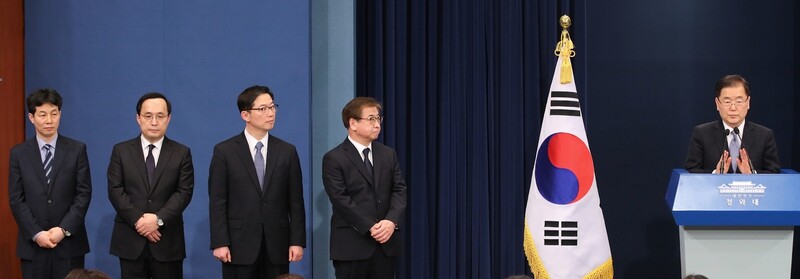hankyoreh
Links to other country sites 다른 나라 사이트 링크
South Korean special delegation to travel to US on Mar. 8

The members of the special delegation to North Korea plan to visit the US on Mar. 8 to explain the outcome of their visit to the Donald Trump administration after being given the “optimal conditions” from leader Kim Jong-un to mediate dialogue between Pyongyang and Washington.
Afterwards, the delegation members plan to visit China, Russia, and Japan to share the content of their discussions and solicit cooperation. The plans mean South and North will effectively be joining forces to enlist support from the other countries in the Six-Party Talks framework.
“National Intelligence Service director Suh Hoon and I will be visiting the United States,” Blue House National Security Office director Chung Eui-yong said on Mar. 6 while explaining the outcome of the delegation’s visit after his return from Pyongyang.
“After visiting the US, I will also be visiting China and Russia, while Suh Hoon will be visiting Japan,” he added.
Chung and Suh – seen as the two heads of the special envoy’s delegation visiting the North – are reportedly already planning to visit the US as early as Mar. 8 to communicate Kim Jong-un’s position to Trump. As of Mar. 6, the schedule for meeting Trump had not yet been confirmed, sources said.
Chung and Suh’s announcement of plans to personally visit China, Russia, and Japan was seen as particularly notable. It is seen as reflecting the Moon administration’s commitment to enlisting the support of other countries to ensure that the two side’ hard-won achievements do not go to waste.
“In the process, we plan to use the support and cooperation of the international community as basis for the stable development of inter-Korean relations,” Chung said.
The Blue House’s decision to focus on winning support from other countries is seen as reflecting the conclusion that eliminating the military threat against North Korea and guaranteeing its regime’s security will only be possible with an end to the armistice system.
A need for trilateral military dialogue with the United States“This speaks to the need for trilateral military dialogue with the US,” said Institute for National Security Strategy senior research fellow Cho Sung-ryul, who predicted it would “lead to four-party discussions with the US and China toward a peace agreement.”
For now, the Moon Jae-in administration will have an easier time winning the US’s support as a self-appointed mediator between Pyongyang and Washington. In addition to meeting the US’s demands for a “commitment to denuclearization” by stating that there has been “no change in the teaching of past generations that the goal is denuclearization,” Kim Jong-un also declared an effective moratorium on nuclear and missile testing, thus removing the grounds for even the hard-liners in the US and Japan to refuse dialogue with the North.
In response to news of the inter-Korean agreement, Trump tweeted, “We will see what happens!” His brief message accompanied a retweet of a Drudge Report article on the meeting between Kim and the South Korean delegation.
After previously proposing a two-track approach of resolving the North Korean nuclear issue through simultaneous efforts toward denuclearization and negotiations to sign a peace agreement on the peninsula, China and Russia appear poised to play a potential in rule in later discussions.
By Kim Ji-eun and Noh Ji-won, staff reporters
Please direct questions or comments to [english@hani.co.kr]

Editorial・opinion
![[Column] Park Geun-hye déjà vu in Yoon Suk-yeol [Column] Park Geun-hye déjà vu in Yoon Suk-yeol](https://flexible.img.hani.co.kr/flexible/normal/500/300/imgdb/original/2024/0424/651713945113788.jpg) [Column] Park Geun-hye déjà vu in Yoon Suk-yeol
[Column] Park Geun-hye déjà vu in Yoon Suk-yeol![[Editorial] New weight of N. Korea’s nuclear threats makes dialogue all the more urgent [Editorial] New weight of N. Korea’s nuclear threats makes dialogue all the more urgent](https://flexible.img.hani.co.kr/flexible/normal/500/300/imgdb/original/2024/0424/7317139454662664.jpg) [Editorial] New weight of N. Korea’s nuclear threats makes dialogue all the more urgent
[Editorial] New weight of N. Korea’s nuclear threats makes dialogue all the more urgent- [Guest essay] The real reason Korea’s new right wants to dub Rhee a founding father
- [Column] ‘Choson’: Is it time we start referring to N. Korea in its own terms?
- [Editorial] Japan’s rewriting of history with Korea has gone too far
- [Column] The president’s questionable capacity for dialogue
- [Column] Are chaebol firms just pizza pies for families to divvy up as they please?
- [Column] Has Korea, too, crossed the Rubicon on China?
- [Correspondent’s column] In Japan’s alliance with US, echoes of its past alliances with UK
- [Editorial] Does Yoon think the Korean public is wrong?
Most viewed articles
- 1‘We must say no’: Seoul defense chief on Korean, USFK involvement in hypothetical Taiwan crisis
- 2N. Korean delegation’s trip to Iran shows how Pyongyang is leveraging ties with Moscow
- 3[Column] Park Geun-hye déjà vu in Yoon Suk-yeol
- 4Amnesty notes ‘erosion’ of freedom of expression in Korea in annual human rights report
- 5‘Weddingflation’ breaks the bank for Korean couples-to-be
- 646% of cases of violence against women in Korea perpetrated by intimate partner, study finds
- 7[Reportage] On US campuses, student risk arrest as they call for divestment from Israel
- 8“Parental care contracts” increasingly common in South Korea
- 9[Interview] Dear Korean men, It’s OK to admit you’re not always strong
- 10Korean government’s compromise plan for medical reform swiftly rejected by doctors